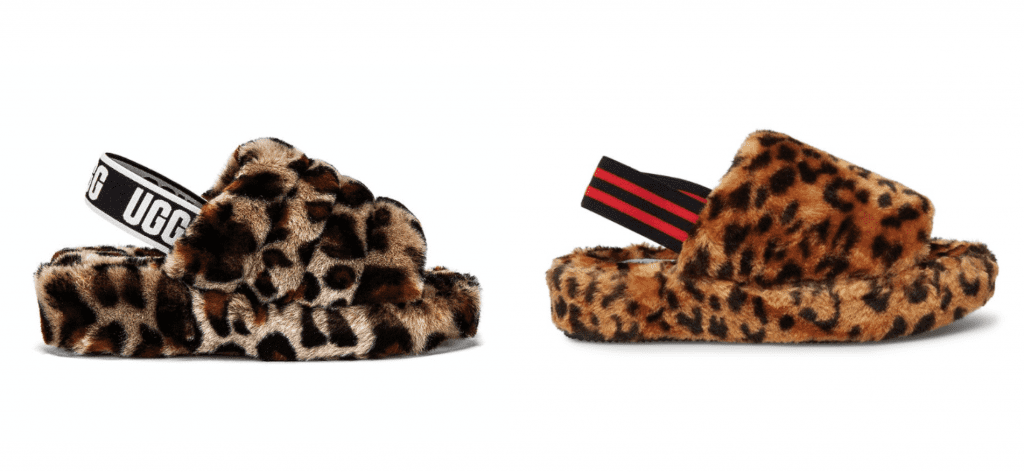UGG’s rather litigious parent company Deckers Outdoor Corp. is suing the similarly lawsuit-happy Steve Madden on the basis that its fellow footwear company hijacked one of its protected designs. According to the complaint that Deckers filed in a California federal court on Tuesday, Steve Madden is on the hook for trade dress infringement, unfair competition, and design patent infringement in connection with its manufacture and sale of a fluffy, slingback slipper, one that Deckers claims looks a bit too much like one that its’ UGG brand has sold – and heavily promoted – in recent years.
In its newly-filed complaint, Goleta, California-based Deckers asserts that “competitor” Steve Madden has actively sold a lookalike pair of “Fuzz” slippers “in an effort to exploit Deckers’ goodwill and the reputation of [UGG’s Fluff Yeah shoe],” and that such “bad faith and unlawful acts have misled and confused consumers, and were intended to cause confusion or to cause mistake, or to deceive as to the affiliation, connection, or association of the [allegedly infringing footwear] with Deckers, and the origin, sponsorship, or approval of the product by Deckers,” with such elements of confusion and mistake being central to a claim of trademark – or here, trade dress – infringement.
Deckers claims that this is not merely a run-of-the-mill example of legally above-board inspiration, and instead, is a case of infringement, as the design of its UGG Fluff Yeah Slide is protected by federal trade dress – a subset of trademark law that extends to the overall image of a product, such as the color, shape, size, and/or configuration, as long as the design has the same source-identifying function as a traditional trademark – and Madden’s infringes upon those rights.
In the case at hand, Deckers alleges that its trade dress for the Fluff Yeah shoe consists of “a slipper and sandal combined into a statement shoe made famous by the UGG brand [with a] platform, sling back slide; a platform sole with a furry footbed and furry perimeter sides; a wide vamp having a furry exterior; an open toe; and an elastic heel strap extending from one side of the vamp to the other.”
Interestingly, Deckers claims that in addition to the Fluff Yeah trade dress being “non-functional in its entirety, visually distinctive, and unique in the footwear industry,” the product configuration trade dress is “unique and inherently distinctive,” the latter part of which stands in contrast with the holding in the Walmart v. Sarmara Brothers case in 2000, in which the Supreme Court determined that in an “action for infringement of unregistered trade dress, a product’s design is … protectable, only upon a showing of secondary meaning.” In other words, a product design trade dress can never be inherently distinctive, and thus, must be subject to acquired distinctiveness.

Despite asserting that the shoe design is inherently distinctive, the footwear group – which also owns Teva, Sanuk, Hoka One One and Kookaburra – goes on to claim, nonetheless, that the Fluff Yeah has acquired distinctiveness. For instance, Deckers alleges that the shoe, itself, “is one of the most well-recognized and commercially successful styles of UGG brand,” with UGG having sold “millions of dollars worth” of the style. As a result of such sales paired with widespread media attention (which is largely the result of the brand gifting the eye-catching slippers to big-name celebrities, including supermodels Gigi and Bella Hadid), and UGG’s advertising of the particular style, all of which act as factors used to establish secondary meaning.
With the foregoing in mind, Deckers claims that “the Fluff Yeah trade dress has achieved a high degree of consumer recognition and secondary meaning, which serves to identify Deckers as the exclusive source of footwear featuring said trade dress,” and thus, “by producing, distributing, advertising, and offering for sale confusingly similar reproductions of [it] … [when] there are numerous other shoe designs in the footwear industry, none of which necessitate copying or imitating the Fluff Yeah trade dress,” Madden has infringed its trade dress rights and also engaged in unfair competition in violation of California state law.
In addition to citing claims of trade dress infringement and unfair competition, both of which center on a likelihood that consumers will be confused as to the source of and/or UGG’s connection to or endorsement of the allegedly infringing products, Deckers points to a design patent that it holds for the “ornamental design of the upper and midsole” of the Fluff Yeah slipper. It claims that while Steve Madden was put on notice of its rights in the shoe design (as a result of the initial “patent pending” label that UGG used in connection with the shoes before its patent was issued), the New York-headquartered footwear brand opted to copy the shoe “knowing the objectively high likelihood that such actions constituted patent infringement,” making its acts “willful” and the case “exceptional” in nature, and thereby, warranting an increased damages award.
As for the strength of Deckers’ design patent infringement claim, design patent expert and University of Oklahoma College of Law professor Sarah Burstein notes that “design patents protect the actually-claimed design, not larger design concepts.” As such, Burstein says that she does “not think [that Madden’s lookalike slipper] is close enough to infringe Deckers’ patent, as a matter of law.”
Deckers is seeking injunctive relief to permanently bar Madden from further “infringing” its footwear design, has asked the court to force Madden to recall and destroy any and all existing pairs, and is also seeking an array of monetary damages.
A rep for Steve Madden was not immediately available for comment.
*The case is Deckers Outdoor Corporation v. Steve Madden, LTD., et al, 2:20-cv-03670 (C.D.Cal.)











